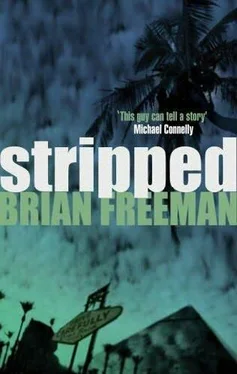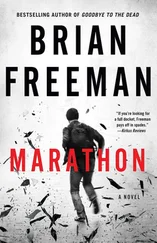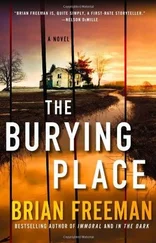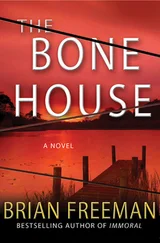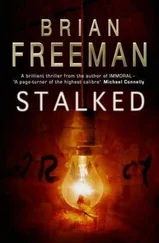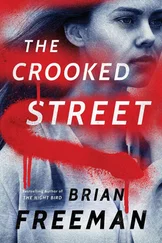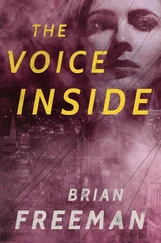“Was Blake with her on Saturday night, too?”
“No. She dismissed him when she was going to meet MJ.” Kamen added, “I hope you’re not suggesting that any of my people could be involved in the string of murders. Or that we released information about the schedules of our clients.”
“We’re just looking for connections,” Serena said. “When two of our murder victims have ties to the same security agency, we get curious.”
“We work with hundreds of clients, Detective, including many of the most famous people in the city. If someone decides to murder celebrities, or people close to them, there’s a good chance we’ll have a relationship. There’s nothing odd about it.”
Serena knew he was right. Tracking celebrities in Vegas was like shooting fish in a barrel. They were everywhere.
She raised the other names with him-Linda, Carter, and Peter Hale, Albert and Alice Ford-and wasn’t surprised to find that neither of those middle-class families had anything to do with Premium Security. Kamen looked relieved.
“Do you have any other celebrity clients that have ties to the Sheherezade casino?” Serena asked.
She saw a flutter of hesitation in his eyes. “I’m sure there are many,” he replied cautiously. “The Sheherezade has been around for years. Why?”
“There may be a link between the victims and the casino.”
“What kind of link?” Kamen asked.
“We’re not talking about that publicly yet,” Serena replied. “You sound like you’re holding out on us, Mr. Kamen.”
He was silent, pursing his lips and studying her intensely. Serena had the uncomfortable feeling that this was the same look he used on victims through the scope of his sniper’s rifle. “Mr. Kamen?” she added.
“We don’t have any actual ties to the Sheherezade,” he said.
Cordy leaned forward. “Actual ties? How about unactual ties? Sideways ties? Give us a clue, Dave.”
Kamen looked as if he would rather chew glass. “The agency is owned by Mr. Fisso,” he said.
“Boni Fisso owns Premium Security?” Serena asked.
“He owns many businesses,” Kamen said. “Slot manufacturing. Direct marketing. Golf apparel. He has no active day-to-day role in our operations. It’s simply an investment.”
Cordy’s white teeth shone as he grinned at Kamen. “So you’re telling me that you and the boys never do any private work for Mr. Fisso? Teach a few slot cheats that they’re messing with the wrong guy?”
“Nothing like that,” Kamen said through tight lips.
Serena didn’t buy that for a minute. A security agency owned by Boni Fisso was a great way to get muscle on demand and cloak their shadier services under the guise of a legitimate operation. It also explained the low-rent location, to keep the entire agency under wraps. She wondered whether any celebrity secrets made their way back to Fisso as grist for influence and blackmail.
Still, she knew they didn’t have enough, just based on the ties to Karyn and Tierney, to get a warrant to open up their books and go digging. Kamen and Boni were safe for the time being.
“If someone else gets killed and we find out you had information that might have prevented it, we’re going to be taking a long, hard look at Premium Security,” she said. “Is that clear?” Serena knew it was an empty threat, but she made her voice cold and hard.
“Of course, Detective.” Kamen wasn’t intimidated.
Cordy reached inside his jacket pocket to retrieve a copy of the police sketch and handed the paper across the desk. “Now it’s time for show and tell, Dave.”
“We want you to take a look at this sketch and then show it around to your men,” Serena added. “If anyone has seen this man, we need to know about it immediately. And tell them to watch out for him around your clients.”
“Naturally,” Kamen said. He unfolded the sketch and laid it facedown on his desk, using his thumbs to smooth out the creases. He turned it over, and the dark eyes of the killer stared up at him.
Serena watched his face turn to ash.
Stride had never been in a private jet before. It beat hell out of flying cattle class, where he spent most of the flight with his knees almost under his chin. The Gulf-stream cabin offered seating for eight in rich ivory-colored recliners that seemed to swallow up his body in leather and cushiony foam. He was the only passenger, just him, two pilots, and a middle-aged flight attendant who smiled at his overawed expression. He had his choice of sitting at a maple dining table or lounging in front of an entertainment center with satellite music and movies. When the flight attendant, whose name was Joanne, described a lavish lunch, he chose to sit at the dining table, read the Wall Street Journal , and watch the desert terrain giving way to the Rockies forty thousand feet below him. It was easy to pretend for a few minutes that he was one of the super-rich, and he realized it was a lifestyle that would be easy to get used to.
He changed seats after lunch and settled in with a cup of black coffee that tasted dark and smoky, exactly how he liked it. Joanne showed him how to navigate the remote control, and he found the country music station on satellite radio and boomed it through the cabin. He figured it was the first time that anyone on this plane had heard Tracy Byrd singing “Watermelon Crawl,” but Joanne was kind and didn’t complain. His plan was to review his notes on the case and plow through more of the research he had done on Walker Lane. Despite the coffee, though, the heavy lunch and the bouncing of the jet as it passed over the mountains acted like a sedative. Several days of stress and sleeplessness caught up with him, and he wound up reclining the seat and closing his eyes.
His dream took him back to Minnesota. He was on the beach in front of his old house on a finger of land jutting out between Lake Superior on one side and the placid harbor water on the other. He was in a dirty plastic lounge chair, watching the lake waves crash on the shore, and his first wife, Cindy, was in a matching chair beside him. They held hands. Every hand had a different feel, and he could actually touch hers again and feel the prongs of her emerald ring scratching his skin. She didn’t talk. There was a part of him that knew it was a dream, and he wanted to listen to the sound of her voice again, which had faded in his memory over the years, but she was quiet, staring at him, loving him. Eventually, in his dream, he fell asleep, and when he awoke, he was alone on the beach. Her chair was gone. There had been children playing by the waves, running in the sand, but they were gone, too. There had been an ore boat moored out on the water, the kind of ship on which his father had worked until a winter storm washed him into the lake, but the boat was gone, too.
Stride woke up as a thermal jostled the plane, and he heard Montgomery Gentry singing “Gone” on the satellite radio. That was how the dream made him feel. Long gone.
Joanne told him they were getting ready to land, and Stride looked out to see snowy peaks looming beyond the downtown Vancouver skyline. He knew why he had dreamed of Cindy. They had been to Vancouver together once, several years earlier, when they took a cruise of the Alaskan inner passage. They had spent a weekend in the city after the cruise, and it had been magical, jogging together through the fog of Stanley Park in the early morning and eating Dungeness crab meat from the market on Granville Island on a bench by the water, surrounded by hungry gulls. He remembered thinking on that trip that he had never been quite so happy in his life. It wasn’t long after they returned that a teenaged girl named Kerry McGrath disappeared, launching one of the darkest investigations of his career. In the midst of it, his beautiful Cindy was overrun by cancer, so swiftly and appallingly that he barely recognized her in the end. He figured later that the cancer had already taken root while they were in Vancouver. He wondered what that said about life, and he wasn’t sure he wanted to know.
Читать дальше
